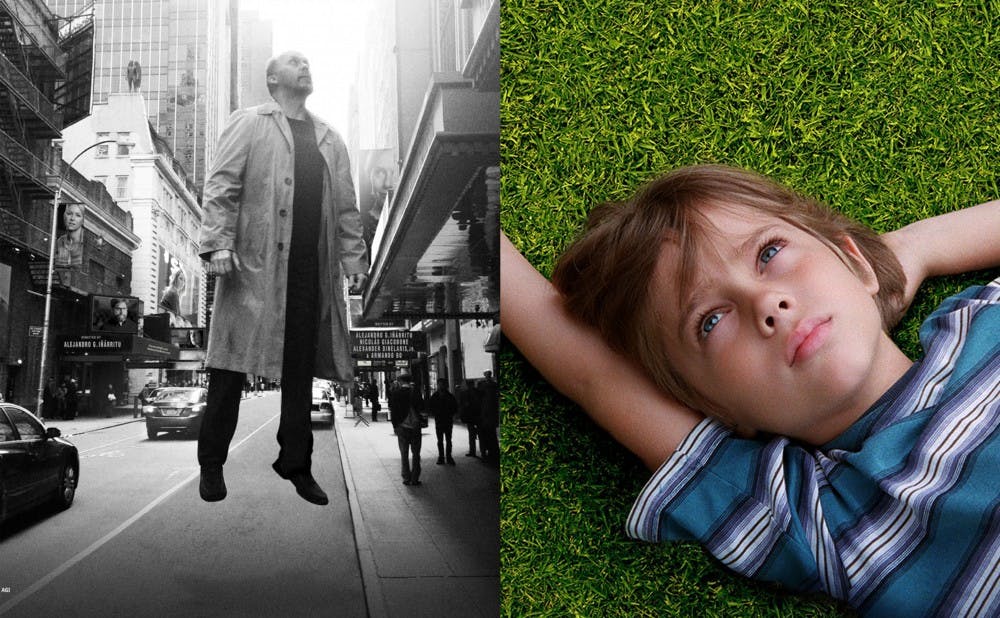With less than two weeks left until the Academy Awards, the race for Best Picture has slowly turned into one of the most competitive contests in years. A while back, before any of the nominees were even released, there was early buzz that Bennett Miller’s Foxcatcher was going to be the film to beat. Well, there’s no other way to phrase this: it's not even close. This year’s most prestigious award will almost undoubtedly be presented to either a washed-up superhero (no, not Hancock) or a film where the make-up artists were so good you’ll believe the actors are actually growing up right before your eyes. In case you didn’t pick up what I’m putting down, I’m talking about Birdman and Boyhood.
To start out, I want to say that both films are cinematic achievements in their own right. Boyhood follows Mason, a young boy whose parents are already separated by the time we meet him. This coming of age story tracks him as he grows up from five to 18 years old. This is Richard Linklater’s passion project, his love letter to maturation and the realistic nature of life itself. It does not require major plot twists or character soliloquies to provide impact, but, rather, it allows the subtle changes and realizations of a young boy growing up to reveal its core. The cast, including Ethan Hawke and expected Best Supporting Actress winner Patricia Arquette, anchor the film with nuanced and emotional performances as separated parents who mature just as their children do. Filmed for short periods of time with the same actors over 12 years, Boyhood is an unforgettable accomplishment in filmmaking. At the onset of Oscar season, following a Golden Globe victory, this was unquestionably the frontrunner.
But then Birdman flew into the scene, and everything unexpectedly changed. Birdman follows former superhero star Riggan Thomson, played by former superhero star Michael Keaton (starting to catch on?) as he attempts a comeback to fame by writing, directing and starring in a Broadway adaptation. Director Alejandro González Iñárritu delves into the highly unstable and absurd nature of celebrity culture, even poking fun, through the excellent work of Edward Norton, at the concept of method acting. The film creates a trippy, surreal experience with a combination of (what appears to be) a long, unending take layered with occasional (imaginary?) super-powered outbursts and a drummer that seems to always be in the right place at the right time. Coming off of SAG, PGA and DGA, victories, it appears Birdman has catapulted itself into the lead.
So, who should win between these two exceedingly dissimilar and distinctive films? Well, I’d love to be cheesy and say they should tie or some crap like that, but I won’t. Decisions must be made. While I think Boyhood is an incredible achievement with almost documentary-like precision in its coming-of-age tale, Birdman is a more in-depth, unique, and––I’ll just say it––better movie.
First off, Birdman's acting is a transcendent triumph for the majority of the cast. Michael Keaton is unnerving, yet meticulous; it’s humorous, yet melancholic, a range in one film that many will never reach in their careers. Edward Norton is back to his quirky, fast-paced, ill-tempered banter. His chemistry with Keaton leads to some of the most entertaining and dynamic scenes the film has to offer. Emma Stone steps up to the plate with the heavy hitters and delivers a haunting, evocative performance, especially with her resonating speech on what it means to be “relevant.” Even the supporting cast of Zach Galifianakis, Naomi Watts, Andrea Riseborough and Amy Ryan pull their weight to keep the film flowing.
On the topic of fluidity, cinematographer Emmanuel Lubezki creates the illusion of a continuous take over the course of a few days to add a bizarre, panic-inducing structure to the film. As an audience, we question the fracturing psyche of our protagonist, who, in spite of his numerous insecurities, seems convinced of his superhuman abilities. We are disturbed by his unyielding desire for respect and admiration from fans, while his drug-abusing, chaotic daughter is left on the sidelines. The film allows us to question the blurred line between artistic integrity and mindless commercial filmmaking in our own society.
Though it’s nice to have Boyhood’s honest and nostalgic account of maturation, Birdman’s cynical, introspective dramedy asks us to stop for a minute and question our society's peculiar culture. With cinematic mastery at work, Birdman is the film to beat.
Get The Chronicle straight to your inbox
Signup for our weekly newsletter. Cancel at any time.

